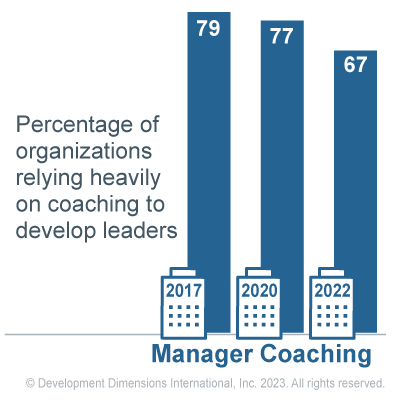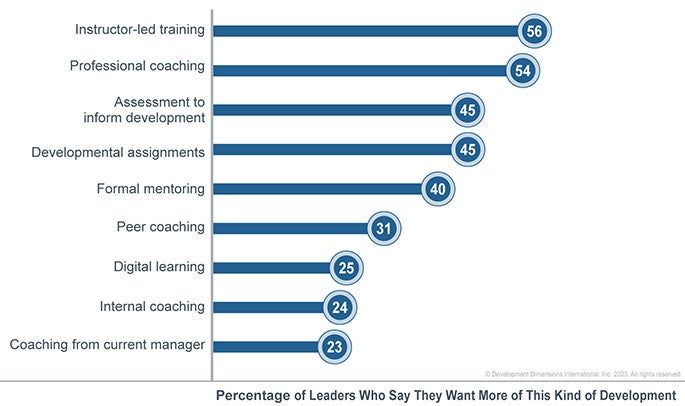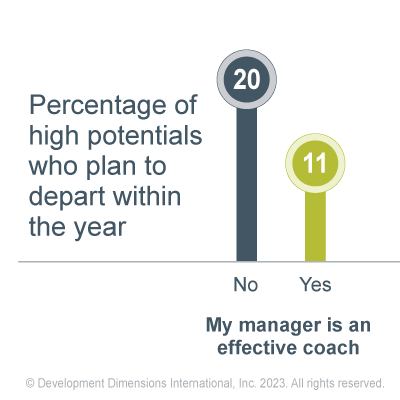According to DDI’s Global Leadership Forecast (GLF) 2023 research, companies’ interest in manager coaching as a development method may be dwindling. Significantly fewer leaders than in the 2021 survey reported they want coaching from their manager as a means to develop. And the news story for coaching delves even further into grim territory: When asked to rate their most desired forms of development, leaders identified coaching from their managers as their least desired development type.
So, is coaching truly losing its popularity with leaders? Or is there something else preventing leaders from wanting coaching from their boss? And is workplace coaching even an effective form of development? In this blog, we’ll get to the bottom of these questions.
The Buzz Surrounding Manager Coaching

Of course, the previously stated question on the popularity of coaching is a rhetorical one. We know there must be something else at play because that same GLF research also shows that leaders who say their managers have good coaching skills also report wanting more coaching from them. Shocking, isn’t it? Okay maybe not so much, but what is somewhat surprising is there are still many leaders who report that their manager isn’t great at coaching.
That’s surprising considering that coaching skills are such a popular criterion for leadership success these days. The topic of workplace coaching gets a lot of attention. It’s a key component of leadership development programs and on the minds of many business leaders who consistently, when discussing their business drivers and leadership Success ProfilesSM, tell us they need leaders who can coach and develop others. With all this focus, it’s hard to imagine any leader, especially a leader of leaders, not having developed decent enough coaching skills for their teams to consider them effective at it. Yet here we are.
Now at this point, some of you may be wondering, “Why do coaching skills matter anyway?” (And quite possibly, the same people asking this are the ones not getting the best grades on their coaching skills.)
Let’s explore briefly why effective manager coaching matters.
Why Good Workplace Coaching Skills Matter
Coaching is first and foremost built on trust. This means I trust my coach to have my best interest at heart and that their primary intention towards me is to enhance my success. Because of this underlying benevolent philosophy, building leaders’ coaching skills should help build trust within the organization. The benefits of that trust, at the team and organizational levels, are well-documented.
However, it’s not just this gain in trust that can yield benefits from coaching. Coaching can also increase the return on the investment companies make in other forms of leadership development. This includes self-directed or online learning programs, facilitator-led programs, and special developmental assignments.

On the latter, our GLF research supports the notion that leaders do want developmental assignments. This method of development was tied for the third most-desired learning approach in the 2023 GLF. However, internal coaching—from a manager or someone else involved in the project—is critical to the success of this development method. Why?
Coaching induces moments of self-reflection where the learner can process situations they’ve encountered and determine the effectiveness of their thoughts and actions. This, in turn, leads to focused goal setting and thus greater intentionality of actions and efforts, all of which are instrumental in helping convert learnings into actions on the job.
Additionally, assuming the objectives of development activities are well aligned with the business strategy, coaching can help facilitate desired behaviors required to achieve the business strategy.

The Impacts of Effective Coaching
As stated earlier, when it comes to coaching from one’s immediate superior, the quality of the coaching is key. You know, that shocker of a finding we presented earlier: When the coaching is good, the impacts are great and people want more of it!
According to our GLF research, leaders who get quality coaching from their managers are:
- 4.3x more likely to feel they have a clear development path as a leader.
- 2.7x more likely to feel accountable for being an effective leader.
- 1.5x less likely to feel they have to change companies to advance.
So, what is quality coaching? And if effective coaching yields such great benefits, why isn’t every leader great at it?
5 Elements of Quality Workplace Coaching
I started this reflection on coaching by highlighting the important element of trust. Here are some examples of how this trust is achieved and what quality coaching might look like:
- Success is the primary focus: The coachee believes that their success is what drives their leader’s coaching behaviors towards them.
- Superior listening skills: The coach is fully immersed in the moment and always attentive to what they are perceiving and hearing from the coachee.
- Courage and empathy: The coach has the emotional intelligence needed to recognize when candid feedback is required to trigger action or motivation from the coachee and the courage to deliver it clearly and empathetically.
- Humility: The coach has the ability to tame their ego in the pursuit of betterment, rather than providing answers and solutions. (The coachee also needs to practice humility for the coaching to be effective.)
- Curiosity: The coach asks great questions, remains neutral, and allocates enough time to uncover the levers to a coachee’s success.
So, how do your leaders stack up against the above criteria? When looking at the list, does it surprise you that many leaders are not considering their managers as effective coaches?
In reflecting on this list of qualities, one insight starts to emerge. It may get increasingly difficult for leaders to be effective coaches as they progress to roles of greater accountability. The pressure mounts as their roles advance, and many new executives start to struggle with four distinct forces of pressure around leading the business, their teams, their networks, and themselves. Because of this, it can become harder for many of them to become or remain good at coaching.
Where Leaders Go Wrong as Coaches

What else causes leaders to struggle as coaches? Keeping the coachee’s success as well as their individual style, talents, and preferences openly at the forefront of the relationship is no easy feat.
This is particularly true when you’re their leader and have had success yourself using your own tricks and tips. Leaders also have a vested interest in continuing this success for the team, function, or company. And then throw in time pressures and financial incentives such as bonuses, stock options, salary increases, and so on.
You’ll quickly realize that remaining curious and humble is easier said than done, especially when the quarterly clock is ticking and priorities are piling up. From that vantage point, it’s easy to conclude that it’s more efficient to give someone the recipe for success and let them follow it than to try to discover it with them.
Leaders as coaches are likely much more inclined to be very prescriptive towards problem solving. They’re also more likely to strive to show their competence, knowledge, and intelligence, and to feel accountable for solving the person’s challenges. Often, it’s in their DNA as leaders. Most importantly, it’s how many of them have traditionally achieved success.
The wonderful Marshall Goldsmith, a renowned and highly successful executive coach and writer, illustrated these ideas and many more very well in what remains one of my favorite books, What Got You Here Won’t Get You There.
Should Managers Still Be Coaches?
So, if it can be difficult for a manager to be effective at coaching their own people, should we abandon the idea of trying to turn leaders into good coaches?
Well, according to the 2023 GLF, that might be hasty. High-potential employees want more feedback and development opportunities, and coaching caters to both of those needs. Plus, let’s remember, leaders who report their own leader is a good coach want more coaching from them. (Not to mention all the other benefits of coaching, some of which we illustrated here.)
So, what to do with this coaching conundrum? We want leaders to coach and develop their people. But when the quality of coaching isn’t there, neither are the benefits.
Here are a few ideas to optimize the effectiveness of your managers as coaches:
1. Train managers on the right coaching skills.
We’ve touched on many of the skills that make for an effective coach already in this blog. These include skills like listening, empathy, emotional intelligence, feedback, and more.
But there are also ways effective coaches help their coachees define the objectives of the relationship and specific coaching techniques to get the best results based on the objectives. We’ve previously written on this and more in our blog on the five best practices for coaching employees. Additionally, there are coaching courses specially designed for leaders. These courses help leaders learn how to best connect with their people and champion growth goals.
2. Select leaders who have the right fundamentals to become effective coaches.
Many organizations are already seeking these qualities in the leaders they hire and promote. Unfortunately, many others still don’t, or at least don’t use the right tools to understand a leader’s coaching capacity.
This includes the previously mentioned qualities of good coaches and other aspects related to a proper balance between commercial, power, recognition, and altruistic values. Objective assessments can also help.
3. Include proper diagnostics and feedback loops, so coaches know how they are doing and how they can continue to improve.
Too many organizations’ leadership development efforts fall short because they adopt a “one-and-done” mindset. Ongoing, objective feedback is required to sustain new and established coaching habits. Repetition and expansion of the core knowledge around coaching skills is also crucial.
4. Bring in external help in the form of a professional coach when trust is an uncertain variable in the internal coach/coachee relationship.
An immediate superior, by definition, holds a position of authority over their employee-coachee. In addition to this, they also tend to have access to resources, information, and contacts that the coachee may not have access to.
There is a relationship of high dependence between the coachee and their leader coach. These elements can all cause interference to a coaching relationship and inhibit the emergence of full trust and transparency.
When trust is lacking internally between a coach and a coachee, it may be time to consider hiring an external coach. But it may also be time to hire an external coach if the current or prospective coach does not display the stated abilities of a coach, nor has the time, resources, or interest for developing them.
Effective Manager Coaches Win, Too
In conclusion, we’ve highlighted that organizations seem to have taken their foot off the coaching skills accelerator. However, those that invest in creating a strong coaching culture reap important benefits.
We’ve also illustrated that not everyone can make good coaches and that bad coaching can backfire as a developmental initiative. Coaching skills need clarity of purpose and practiced behaviors. Building effective manager coaching skills requires ongoing feedback and continuous improvement.
When those parameters are present, leader-coaches will truly receive and achieve the most important and richest benefits of coaching: greater trust, engagement, autonomy, skills, and perspective from their team members. And at that point, the teacher will have become the student.
Learn how to create a coaching culture in your organization, including the latest research on workplace coaching and how to best build your leaders’ coaching skills.
Cheddi Suddith partners with organizations to help them develop and execute their leadership strategy. He combines vast experience in executive assessments with a background in leadership development and training effectiveness. A self-described eclectic, his passion at work is fueled from helping people at all levels succeed and grow through their work and helping organizations achieve the same through their people.
Topics covered in this blog

